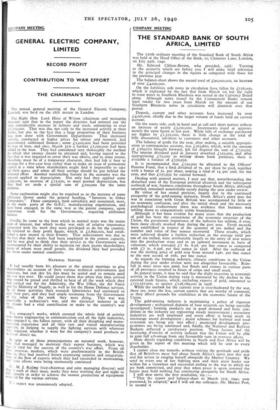COMPANY MEETING
THE STANDARD BANK OF SOUTH AFRICA, LIMITED
The 127th ordinary meeting of the Standard Bank of South Africa was held at the Head Office of the Bank, to, Clements Lane, London, on July 24th, 1940.
Mr. Edward Clifton-Brown, who presided, said: Turning to the accounts which are before you I will make brief reference to the principal changes in the figures as compared with those for the previous year.
The balance-sheet shows the record total of £90,000,000, an increase of over £4,000,000.
On the liabilities side notes in circulation have fallen by £158,000, which is explained by the fact that from March 1st last the right to issue notes in Southern Rhodesia was vested in the Currency Board alone. Although notes issued by the Commercial Banks remain legal tender for two years from March 1st the amount of our Southern Rhodesia notes in circulation will diminish over that period.
Deposit, current and other accounts have increased by over £4,1300,000, chiefly due to the larger volume of funds held on current account.
On the assets side, cash in hand and at call and short notices reflects an increase of nearly £3,000,000. Investments stand at approxi- mately the same figure as last year. While bills of exchange purchased are higher by £1,335,000, there is little change in the total of bills discounted, advances to customers and other accounts.
The balance of profit for the year, after making a suitable appropri- ation to contingencies account, was £563,860, which, with the amount of £169,072 brought forward, left for disposal the sum of £732,932. The interim dividend paid in January absorbed £125,000, and after appropriating £75,00o to writing down bank premises, there is available a balance of £532,932.
It is recommended that £150,000 be allocated to the Officers' Pension Fund, that a final dividend of 75. per share be paid, together with a bonus of 2s. per share, making a total of 14 per cent, for the year, and that £157,932 be carried forward.
Dealing with general matters, I may say that, notwithstanding the disturbed state of the European political situation and the subsequent outbreak of war, business conditions throughout South Africa. although unsettled, remained wonderfully steady during the year under review. By virtue of her sound position, largely due to the continued prosperity of the gold-mining industry, South Africa's entry into the war in association with Great Britain was accompanied by little or no economic confusion, and after the initial shock and the necessary psychological readjustment there was evidence that business was settling down to comparatively stable foundations.
Although it has been evident for many years that the production of gold has been the cornerstone of the economic structure of the Union, the paramount importance of the industry has seldom, if ever, been more clearly marked than during the past year. Fresh records were established in respect of the quantity of ore milled and the number and value of fine ounces recovered. These results, which were achieved despite a further reduction .in the average yield per ton of ore milled, were attributable largely to the entry of new mines into the production stage and to an upward movement in basis of valuation, which averaged £7 8s. 8.5d. per fine ounce as compared with £7 2s. 6.39d. per fine ounce in 1938. After the outbreak of war the sterling price of gold rose from around 148s. per fine ounce to the new record of 168s. per fine ounce.
As regards the farming industry, climatic conditions in the Union during the year under review were not altogether favourable. Rain- fall in most areas was good, but floods and storms in various parts of all provinces resulted in losses of crops and small stock.
In general terms, it may be said that the slight recession in economic activity in the Union during 1939 is measured by the decline in the external trade figures, which, excluding exports if gold, amounted to £125,537,000, as against £128489,000 in 1938.
While the outlook for the current year is overshadowed by the war, there are, none the less' certain aspects that are worthy of comment, as they afford grounds for confidence in the economic future of the Union.
The gold-mining industry is mainfaining a policy of vigorous development ; widespread deposits of base minerals are being specially investigated farming products are in good demand and basic con- ditions in the industry are registering steady improvement ; secondary industries are well employed and every effort is being made to encourage sound development ; major schemes for harbour and road extension are being put into effect ; municipal development pro- grammes are being continued and, finally, the National and Railway Budgets reflected a satisfactory position. These factors and the increasing cFversity of activity indicate that the Union will be able to gain full advantage from any favourable turn in overseas affairs. More details regarding conditions in South and East Africa will be given in The report of this meeting which will be sent to every shareholder.
I cannot close my remarks without voicing the gratitude and pride that all Britishers must feel about South Africa's entry into this war and her action in ranging herself alongside the Mother Country. We send to every one of her fighting men and their great leader our wishes for a victorious and successful ending to the war to which we are both committed, and pray that when peace is again restored the future may hold nothing but continuing prosperity for South Africa. I will now move the first resolution, viz.:— "That the report and balance-sheet to March 31st, 1940, now presented, be adopted," Isnd I will ask my colleague, Mr. Horace Peel, to second it






























 Previous page
Previous page